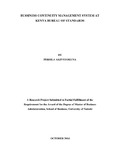| dc.description.abstract | Societal Security - Business Continuity Management System (ISO 22301:2012) is the
world‟s first international standard for Business Continuity Management, developed
by the International Organization for Standardization (ISO) to specify requirements to
plan, establish, implement, operate, monitor, review, maintain and continually
improve a documented management system to protect against, reduce the likelihood
of occurrence, prepare for, respond to, and recover from disruptive incidents when
they arise(ISO 22301:2012). International standards are considered to be the main
drivers for many aspects of Business Continuity Management (BCM) practice (Ihab,
Sawalha, & Anchor, 2012). The Kenya Bureau of Standards (KEBS), the National
Standards Body, adopted this ISO standard as a Kenyan Standard to enable
organizations in Kenya to assess their ability for business continuity after an incident.
No study in Kenya has covered a holistic BCMS whose performance depends on the
implementation of the requirements of the BCMS. The study focuses on three
requirements which include leadership, context of organization and operational
requirements. The general objective of the study was to evaluate the implementation
of BCMS at KEBS. The research design employed in this study is descriptive in
nature. The study focused on KEBS which represents a huge government corporation
in terms of revenue and strategic importance based on standardization (in this case,
management system standard). This study targeted 60 staff members at KEBS
headquarters including the directorate, heads of departments, officers and nontechnical
staff. Primary data was collected using self-administered questionnaires.
The data collected is presented through use of summarized percentages, proportions
and tabulations. The study reveals systems in place at KEBS to address Business
Continuity (BC), top management commitment to the implementation of BCMS at
KEBS and the operational requirements implemented at KEBS. The study concludes
that the Kenya Bureau of Standards has partially implemented BCMS. Major
challenges in full implementation of a BCMS include full top management
commitment, and the absence of government interference and bureaucracy. The study
recognizes that IT outages, data breach, cyber-attacks and business ethics incidents
are major threats to BC at KEBS and recommends improvement on communication/
awareness of BCMS requirements to all staff and accommodation in regulations of the
need for BCMS in Government organizations. | en_US |

